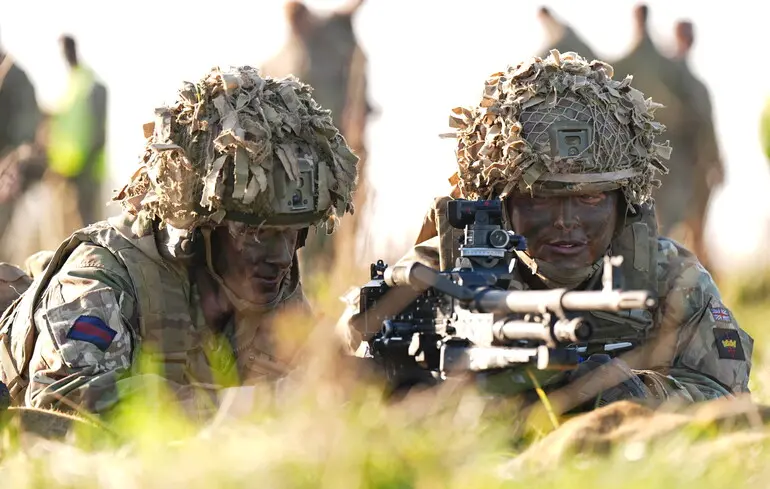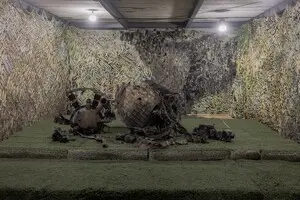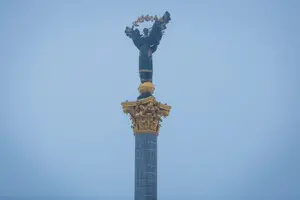Foreign troops in Ukraine. What will make Putin accept this?

Amid the aura of uncertainty that Donald Trump brings, Europe is gradually realizing that it will have to take a greater part in the Russian-Ukrainian war. In any case, Trump has repeatedly stated that it is the European Union, not the United States of America, that should take the main responsibility for helping Kyiv. But while some European countries are looking for ways to force Ukraine to stop resisting the Russian Federation as quickly as possible, others are busy looking for options that can create the preconditions for long-term peace in our country and Europe.
Le Monde writes that London and Paris are discussing sending troops or private military companies to Ukraine. According to the publication, this was discussed on November 11 during the visit of British Prime Minister Keir Starmer to France. So far, the discussion is about training Ukrainian soldiers and repairing equipment. At the same time, as Le Monde notes, the French army is increasingly less restrained and cautious regarding the role that their soldiers can play in Ukraine, especially after the cessation of hostilities.
It is worth noting that it was French President Emmanuel Macron who first spoke publicly about sending Western troops to Ukraine in February. Although a number of countries, primarily Germany, strongly opposed this initiative, the idea was not shelved. During an interview with the BBC, French Foreign Minister Jean-Noël Barrot called for "not setting... red lines" in their support for Ukraine. Answering a question about the possibility of sending French troops to our country, he said: "We are not ruling out any options."
Let me remind you that in May, Macron stated that the introduction of French troops into Ukrainian territory cannot be ruled out. According to him, he would take such a step if the Russian Federation breaks through the Ukrainian defense, and Ukraine asks for help. As Macron assures, his goal is to prevent the Russian Federation from winning.
What shape the British-French plans will take, and whether they will be implemented, is unknown. At the same time, the head of the secretary of state for Foreign, Commonwealth and Development Affairs, David Lammy, says that the United Kingdom is not considering the possibility of introducing troops into Ukraine "now" and his country will maintain its "ancient commitment" to keep troops away from the "theater of military operations." It is strange to hear this from a minister representing a party that, during the time of Prime Minister Tony Blair, "ancient commitment" did not stop sending British troops to countries such as Afghanistan and Iraq.
Most likely, Lammy's words are a diplomatic fog that shrouds secret negotiations. It is in Ukraine's interests to have British and French soldiers in Ukraine. If not now, then at least after the end of hostilities as instructors or participants in joint border patrols. After all, the plans to end the war that are being prepared by Donald Trump's entourage provide for freezing the front line. In this situation, the issue of providing security guarantees is becoming even more urgent for Ukraine.
Obviously, agreements on cooperation in the field of security cannot be considered as such: they are not capable of preventing a new attack by the Russian Federation. Within the framework of the "porcupine strategy", the agreements provide only for strengthening the defense capability of our country and should guarantee long-term military, economic and political support to Ukraine from the West in repelling enemy aggression. But it is also worth noting that compliance with these obligations depends only on the political will of our partners.
Traditionally, it is believed that a guarantee of security for Ukraine is either the possession of nuclear weapons or membership in the North Atlantic Treaty Organization. Obviously, in the near future, both of these scenarios are unrealistic for our country.
Although, according to The New York Times, some officials suggested to Joe Biden that Ukraine return nuclear weapons as a deterrent to the Russian Federation, the current administration will not take such a step, fearing the consequences. Theoretically, given the political will, Kyiv can independently create a nuclear bomb. However, this will require a certain amount of time, which we do not have. In addition, our Western partners will not let us do it: it will not be possible to keep such a project secret. As for our country's membership in the North Atlantic Treaty Organization, the actions of our Western partners demonstrate that despite all the promises given to Kyiv, Ukraine has no chance of joining the Alliance in the medium term. And if Kyiv failed to receive an invitation to join the North Atlantic Treaty Organization under the Biden administration, this will not happen under Donald Trump either. After all, the plans that are being discussed in the office of the newly elected President of the United States of America regarding the end of the Russian-Ukrainian war provide for postponing Ukraine's entry into the Alliance. (In particular, this was proposed by Keith Kellogg, whom Donald Trump nominated for the post of special envoy for Ukraine.)
In this situation, Kyiv is forced to look for additional tools that can guarantee Ukraine's security.
Such a mechanism could be not only the involvement of American and European investors in the development of Ukrainian deposits, but also foreign troops on the territory. And political leaders on Bankova Street are considering this option. If Kyiv concludes an agreement with Moscow, soldiers from the European Union and the North Atlantic Treaty Organization would help ensure the security of our country and Russia's compliance with the ceasefire. At the same time, although it is important how many there will be, the main thing is not the number, but the very fact of the presence of Western soldiers. This is not the first time that Kyiv has raised the issue of the presence of foreign troops on Ukrainian territory — as a force that should force Moscow to fulfill its obligations. In 2015, the Ukrainian government lobbied for the introduction of a United Nations peacekeeping force or a European Union police mission into Ukraine, which would stand on the demarcation line between Ukrainian troops and separatists, as well as along those sections of the Ukrainian-Russian border that were not controlled by Kyiv.
As in 2015, the discussion of this scenario raises questions that have not yet been answered.
What changes in legislation should Ukraine make? Which European countries are ready to send their military units? What will their mandate be? Where will they be located? Will the member countries of the North Atlantic Treaty Organization seek the consent of their Alliance allies to deploy military units in Ukraine? Will the consent of the European Union be required? Or will a bilateral agreement be enough? Will foreign troops on Ukrainian territory take part in hostilities in the event of Russian aggression? What will be the role of the United States of America? How will the issue of the presence of European units in Ukraine be resolved with the Russian Federation?
Each country has its own view on these and other issues. In particular, since the deployment of troops of a NATO member state on the territory of a country where a war is taking place is being discussed, it is expected that this will require the approval of the Alliance members. But Lithuania's representative to the North Atlantic Treaty Organization, Deividas Matulionis, believes that France does not need consent of the North Atlantic Treaty Organization to send troops to Ukraine. "These could be national decisions, a group of countries, a coalition that wants to join this initiative. It is not necessary to have approval of the North Atlantic Treaty Organization or mark here," Matulionis explained.
Today, sending a European contingent to Ukraine to participate in military operations looks unlikely. As Estonian Defense Minister Hanno Pevkur stated, the risks of involving Western troops in military operations "outweigh the benefits." But it is worth noting that recording the presence of European troops should become part of a future peace settlement. However, this could cause serious problems.
Kremlin representatives declare on all TV screens that one of the goals of the "special military operation" is to stop advance of the North Atlantic Treaty Organization to the East. And for the Kremlin propaganda, European troops in Ukraine and bases of the North Atlantic Treaty Organization are all the same. Therefore, it is necessary to look for arguments today that will force the head of the Russian Federation Putin to accept the presence of British or French, Polish or Swedish units on Ukrainian territory.
For now, Putin feels like he is on top. After all, Russian troops, albeit with huge losses, are pushing back our soldiers, the elites remain loyal, and the population supports the war with Ukraine. In this situation, there is no desire on the part of the ruler of the Russian Federation to negotiate. On the contrary, he declares his desire to finally destroy Ukrainian statehood and, having demonstrated the weakness of democracy and the West, to reshape the world order.
However, the dollar exchange rate of 114 rubles shows that the economic situation in the Russian Federation is not as good as the Kremlin wants to present it. It is worth noting that the margin of safety is gradually depleting, and the economy, which is increasingly affected by the war and sanctions, is slowing down. This is evidenced not only by the fall of the ruble currency, but also by the increase in the Central Bank of the Russian Federation rate to 21%, and annual inflation of 8%, and the reduction in mortgage volumes. According to Russian experts, the Russian economy has entered a period of stagflation. It is the state of the economy, as well as the prospects for increasing military support for Ukraine, that may be among the arguments that will push the head of the Russian Federation Putin to negotiations and agreement on the presence of foreign troops in Ukraine.
Please select it with the mouse and press Ctrl+Enter or Submit a bug













 Login with Google
Login with Google